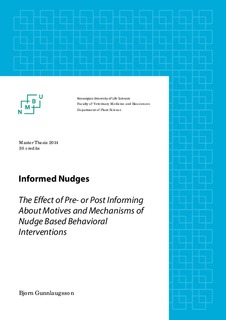Informed nudges : the effects of pre or post informing about motives and mechanisms of nudge based behavioral interventions
Master thesis
Permanent lenke
http://hdl.handle.net/11250/277843Utgivelsesdato
2015-02-26Metadata
Vis full innførselSamlinger
- Master's theses (IPV) [240]
Sammendrag
Nudge based behavioral interventions are increasingly used to address emerging health challenges such as obesity, by helping individuals avoid known human psychological and behaviorally based biases and errors when exercising choice. Nudges are seen as cost effective substitutes for traditional information provision in food choice situations, helping people to avoid conflict between short term pleasure and long term welfare. Nudges are also regarded as manipulative by neglecting the importance of information and knowledge, posing a threat towards people‘s ability to form concious preferences and intentions, and ultimately be responsible for their own choices. Considering perceptions and attitudes towards these concerns of manipulation, knowledge and information, an experiment is conducted where motives and mechanisms of a manipulative behavioral intervention are revealed before or after a snack choice. Key findings include a pre and post information difference in; 1) The support to manipulative choice design for health promoting behavioral interventions, giving indications that in addition to information content, timing is a critical element to secure long term effectiveness of nudges; 2) The value of knowledge regarding choice influencing, indicates importance of timing of information provision, experience and reflection when designing nudges as part of holistic participatoric behavioral change strategies. The results also support educational value of using timing in information provision to demonstrate value of nudge based behavioral interventions. Differences in effect of timing information appear in perceptions and attitudes depending on whether experiences are directly or indirectly and whether reflections are directed to current or future issues. Further research on this matter is suggested as although indications are weak; this may contribute to explaining behavioral discrepancies between short and long term consequences of choice. Design of nudges that link individual involvement and experience based information provision, can become valuable additions to health promoting strategies, but more understanding is needed to support use with other tested and applied tools used to empower individuals to live a healthy life.
